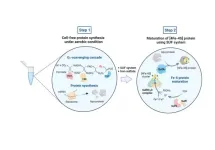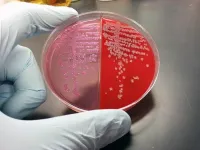(Press-News.org) Scientists at UC San Francisco are working on a new approach to treating kidney failure that could one day free people from needing dialysis or having to take harsh drugs to suppress their immune system after a transplant.
They have shown for the first time that kidney cells, housed in an implantable device called a bioreactor, can survive inside the body of a pig and mimic several important kidney functions. The device can work quietly in the background, like a pacemaker, and does not trigger the recipient’s immune system to go on the attack.
The findings, published in Nature Communications on August 29, 2023, are an important step forward for The Kidney Project, which is jointly headed by UCSF’s Shuvo Roy, PhD (technical director) and Vanderbilt University Medical Center’s William H. Fissell, MD (medical director).
Eventually, scientists plan to fill the bioreactor with different kidney cells that perform vital functions like balancing the body’s fluids and releasing hormones to regulate blood pressure – then pair it with a device that filters waste from the blood.
The aim is to produce a human-scale device to improve on dialysis, which keeps people alive after their kidneys fail but is a poor substitute for having a real working organ. More than 500,000 people in the U.S. require dialysis several times a week. Many seek kidney transplants, but there are not enough donors, and only about 20,000 people receive them each year. An implantable kidney would be a boon.
“We are focused on safely replicating the key functions of a kidney,” said Roy, a bioengineering professor in the UCSF School of Pharmacy. “The bioartificial kidney will make treatment for kidney disease more effective and also much more tolerable and comfortable.”
Inspired by nature, honed by science
Roy and his colleagues engineered the bioreactor to connect directly to blood vessels and veins, allowing the passage of nutrients and oxygen, much like a transplanted kidney would. Silicon membranes keep the kidney cells inside the bioreactor safe from attack by the recipient’s immune cells.
The team used a type of kidney cell called a proximal tubule cell, which regulates water, as a test case. Co-author H. David Humes, MD, from the University of Michigan, had previously used these cells to help dialysis patients in the intensive care unit with life-saving results.
A green light for The Kidney Project
The team tracked the kidney cells and the recipient animals for seven days after transplantation and both did well. The next step will be month-long trials, as required for by the U.S. Food and Drug Administration (FDA), first in animals and eventually in humans.
“We needed to prove that a functional bioreactor will not require immunosuppressant drugs, and we did,” Roy said. “We had no complications and can now iterate up, reaching for the whole panel of kidney functions at the human scale.”
Authors: Additional UCSF authors are Eun Jung Kim, PhD, Caressa Chen, MD, Rebecca Gologorsky, MD, Ana Santandreu, Alonso Torres, Nathan Wright, MS, Jarrett Moyer, MD, Benjamin W. Chui, PhD, Charles Blaha, MS, Paul Brakeman, MD, PhD, Shant Vartanian, MD, and Qizhi Tang, PhD. For all authors, see the paper.
Funding and disclosures: The research was supported, in part, by the National Institutes of Health (U01EB021214, R25EB023856), as well as philanthropy. For all funding sources and author disclosures, see the paper.
About UCSF: The University of California, San Francisco (UCSF) is exclusively focused on the health sciences and is dedicated to promoting health worldwide through advanced biomedical research, graduate-level education in the life sciences and health professions, and excellence in patient care. UCSF Health, which serves as UCSF's primary academic medical center, includes top-ranked specialty hospitals and other clinical programs, and has affiliations throughout the Bay Area. UCSF School of Medicine also has a regional campus in Fresno. Learn more at https://ucsf.edu, or see our Fact Sheet.
###
Follow UCSF
ucsf.edu | Facebook.com/ucsf | YouTube.com/ucsf
END
Can an artificial kidney finally free patients from dialysis?
The Kidney Project proves its bioreactor can keep kidney cells alive for at least one week.
2023-08-29
ELSE PRESS RELEASES FROM THIS DATE:
Researchers discover common origin behind major childhood allergies
2023-08-29
Several major childhood allergies may all stem from the community of bacteria living in our gut, according to a new study led by researchers at the University of British Columbia and BC Children’s Hospital.
The research, published in Nature Communications, identifies gut microbiome features and early life influences that are associated with children developing any of four common allergies — eczema, asthma, food allergy and/or hay fever. The findings could lead to methods of predicting whether a child will develop allergies, and ways to prevent them from developing at all.
“We’re ...
Produce prescription programs yield positive health benefits for participants, study finds
2023-08-29
Around the country, non-profits and local governments are testing the idea of food as medicine through “produce prescription programs”—with promising results, according to researchers from the Friedman School of Nutrition Science and Policy at Tufts University.
By prescribing free, healthy foods similar to how doctors prescribe medications, clinicians and policy makers hope to remove financial barriers to accessing fruits and vegetables to individuals with diet-related illness. Specifically, produce prescriptions offer vouchers, debit cards, or loyalty cards to access free or discounted produce at grocery retail ...
Innovative therapy for anorexia nervosa shows promise
2023-08-29
**EMBARGOED UNTIL 3:00am CT TUESDAY, AUGUST 29, 2023**
Tulsa, Okla. – A trailblazing study conducted by researchers at the Laureate Institute for Brain Research (LIBR) in Tulsa, Okla., has made significant strides with a novel technique for treating anorexia nervosa (AN), an eating disorder characterized by low body weight, body image abnormalities, and anxiety. The study, “The impact of floatation therapy on body image and anxiety in anorexia nervosa: a randomized clinical efficacy ...
An investment in more research to benefit children and adolescents
2023-08-29
Launched in 2019, the Botnar Research Centre for Child Health (BRCCH) aims to drive innovative health research that benefits children and adolescents globally – especially those living in low- or middle-income countries. Within this centre, the University of Basel and ETH Zurich work in partnership with the University Children’s Hospital Basel (UKBB) and the Swiss Tropical and Public Health Institute (Swiss TPH).
Over the past four years, the BRCCH has supported around 80 researchers and 29 research projects worldwide. For example, researchers improved the treatment of cleft lip and palate and developed biotechnology to monitor paediatric gut ...
Maintaining stable weight increases longevity among older women
2023-08-29
Reaching the age of 90, 95 or 100, known as exceptional longevity, was more likely for women who maintained their body weight after age 60, according to a multi-institutional study led by University of California San Diego. Older women who sustained a stable weight were 1.2 to 2 times more likely to achieve longevity compared to those who experience a weigh loss of 5 percent or more.
Reporting in the Aug. 29, 2023 online issue of the Journal of Gerontology: Medical Sciences, researchers investigated the associations of weight changes later in life with exceptional longevity ...
Air pollution and its threat to health are unequally spread throughout the world, and so are the opportunities to combat it
2023-08-29
As global pollution edged upward in 2021, so did its burden on human health, according to new data from the Air Quality Life Index (AQLI). If the world were to permanently reduce fine particulate pollution (PM2.5) to meet the World Health Organization’s (WHO) guideline, the average person would add 2.3 years onto their life expectancy—or a combined 17.8 billion life-years saved worldwide.
This data makes clear that particulate pollution remains the world’s greatest external risk to human health, with the impact on life expectancy comparable to that of smoking, more than 3 times that of alcohol use and unsafe water, and more than ...
Overcoming the challenges to synthesising iron–sulfur proteins outside the glovebox
2023-08-29
Fe–S clusters, which are a part of Fe–S proteins, are found across all forms of life. They play a significant role as biological cofactors—helper molecules that assist these proteins in different biochemical transformations—that are involved in respiration and metabolism. These clusters are of keen research interest since they are considered to be a critical part of evolution. They serve as a link between pre-biotic chemistry (chemical processes that existed prior to the emergence of life forms) and the complex molecular and biological systems we know today. Put simply, they ...
Mothers in prison embrace a parenting program to strengthen bonds with separated children
2023-08-29
The number of women imprisoned in Australia has jumped by 64% in the past decade, leaving thousands of children separated from their mothers and causing huge stress to both parties.
In a bid to ease the strain of separation and maintain the mother-child bond, a new prison parenting program has been developed in close collaboration with women in prison as well as prison staff and key members of the Aboriginal community in South Australia.
The Mothers Matter program, led by University of South Australia midwife and researcher Belinda Lovell, includes direct input from Aboriginal and/or Torres ...
Resistant E. coli rises despite drop in ciprofloxacin use
2023-08-29
After a nearly threefold drop in prescriptions for the antibiotic ciprofloxacin between 2015 and 2021, the rates of ciprofloxacin-resistant E. coli bacteria circulating in the community did not decline.
In fact, a study of Seattle-area women over age 50 who had not taken any antibiotics for at least a year discovered that the incidence of gut-colonizing ciprofloxacin-resistant E. coli actually increased. About 1 in 5 women in the study were affected.
Scientists at the University of Washington School of Medicine, Kaiser Permanente Washington Health Research Institute and Seattle Children’s Hospital ...
Golden rules for building atomic blocks
2023-08-29
National University of Singapore (NUS) physicists have developed a technique to precisely control the alignment of supermoiré lattices by using a set of golden rules, paving the way for the advancement of next generation moiré quantum matter.
Moiré patterns are formed when two identical periodic structures are overlaid with a relative twist angle between them or two different periodic structures but overlaid with or without twist angle. The twist angle is the angle between the crystallographic orientations of the two structures. For example, when graphene and hexagonal boron nitride (hBN) which are layered materials are overlaid on each other, the atoms in the ...
LAST 30 PRESS RELEASES:
ASU researchers to lead AAAS panel on water insecurity in the United States
ASU professor Anne Stone to present at AAAS Conference in Phoenix on ancient origins of modern disease
Proposals for exploring viruses and skin as the next experimental quantum frontiers share US$30,000 science award
ASU researchers showcase scalable tech solutions for older adults living alone with cognitive decline at AAAS 2026
Scientists identify smooth regional trends in fruit fly survival strategies
Antipathy toward snakes? Your parents likely talked you into that at an early age
Sylvester Cancer Tip Sheet for Feb. 2026
Online exposure to medical misinformation concentrated among older adults
Telehealth improves access to genetic services for adult survivors of childhood cancers
Outdated mortality benchmarks risk missing early signs of famine and delay recognizing mass starvation
Newly discovered bacterium converts carbon dioxide into chemicals using electricity
Flipping and reversing mini-proteins could improve disease treatment
Scientists reveal major hidden source of atmospheric nitrogen pollution in fragile lake basin
Biochar emerges as a powerful tool for soil carbon neutrality and climate mitigation
Tiny cell messengers show big promise for safer protein and gene delivery
AMS releases statement regarding the decision to rescind EPA’s 2009 Endangerment Finding
Parents’ alcohol and drug use influences their children’s consumption, research shows
Modular assembly of chiral nitrogen-bridged rings achieved by palladium-catalyzed diastereoselective and enantioselective cascade cyclization reactions
Promoting civic engagement
AMS Science Preview: Hurricane slowdown, school snow days
Deforestation in the Amazon raises the surface temperature by 3 °C during the dry season
Model more accurately maps the impact of frost on corn crops
How did humans develop sharp vision? Lab-grown retinas show likely answer
Sour grapes? Taste, experience of sour foods depends on individual consumer
At AAAS, professor Krystal Tsosie argues the future of science must be Indigenous-led
From the lab to the living room: Decoding Parkinson’s patients movements in the real world
Research advances in porous materials, as highlighted in the 2025 Nobel Prize in Chemistry
Sally C. Morton, executive vice president of ASU Knowledge Enterprise, presents a bold and practical framework for moving research from discovery to real-world impact
Biochemical parameters in patients with diabetic nephropathy versus individuals with diabetes alone, non-diabetic nephropathy, and healthy controls
Muscular strength and mortality in women ages 63 to 99
[Press-News.org] Can an artificial kidney finally free patients from dialysis?The Kidney Project proves its bioreactor can keep kidney cells alive for at least one week.




